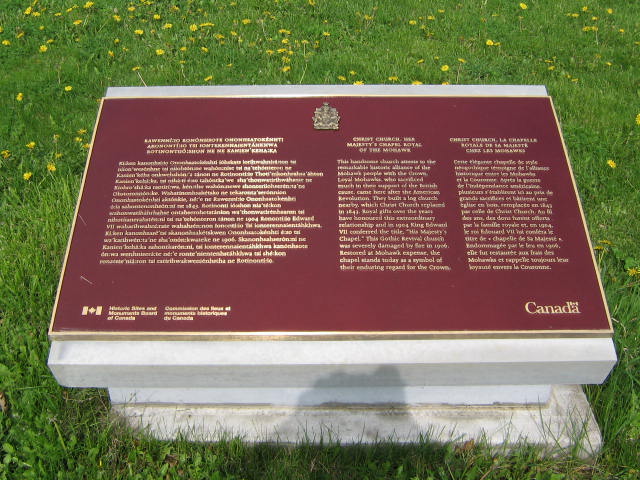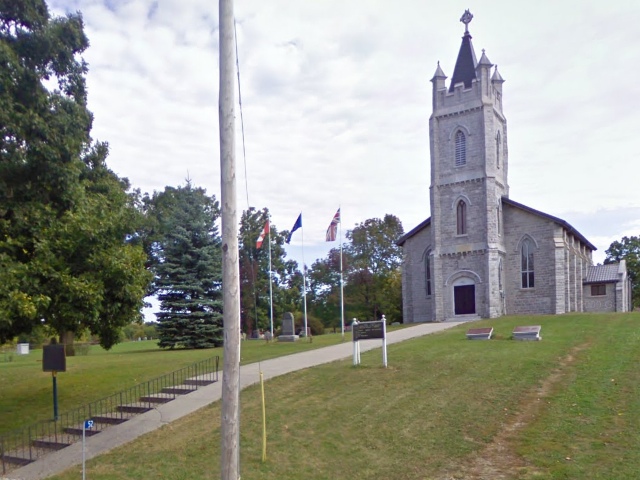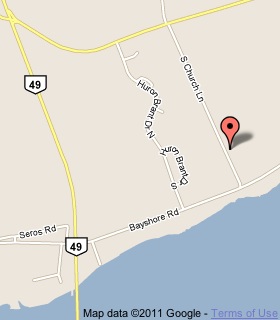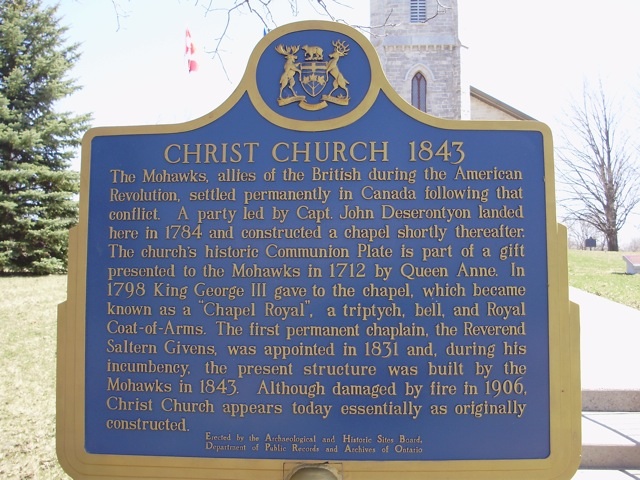Ontario's Historical Plaques
at ontarioplaques.com
Learn a little Ontario history as told through its plaques
Christ Church, Her Majesty's Chapel Royal of the Mohawk
and
Christ Church 1843
There are two plaques at this location.
Both can be seen on this page.

Photo by contributors David & Kellie Clifford - Posted April, 2009

Photo from Google Street View ©2010 Google - Posted December, 2010
Plaque Location
The County of Hastings
Tyendinaga Mohawk Territory
On South Church Lane at street #52
1.5 km from Highway 49 via east on Bayshore Road (Road 16)
then north on South Church Lane
Coordinates: N 44 11.122 W 77 04.420 |
 |
Plaque Text
This handsome church attests to the remarkable historic alliance of the Mohawk people with the Crown. Loyal Mohawks, who sacrificed much in their support of the British cause, came here after the American Revolution. They built a log church nearby, which Christ Church replaced in 1843. Royal gifts over the years have honoured this extraordinary relationship and in 1904 King Edward VII conferred the title, "His Majesty's Chapel". This Gothic Revival church was severely damaged by fire in 1906. Restored at Mohawk expense, the chapel stands today as a symbol of their enduring regard for the Crown.

Photo by contributors David & Kellie Clifford - Posted April, 2009
Plaque Text
The Mohawks, allies of the British during the American Revolution, settled permanently in Canada following that conflict. A party led by Capt. John Deserontyon landed here in 1784 and constructed a chapel shortly thereafter. The church's historic Communion Plate is part of a gift presented to the Mohawks in 1712 by Queen Anne. In 1798 King George III gave to the chapel, which became known as a "Chapel Royal," a triptych, bell and Royal Coat-of-Arms. The first permanent chaplain, the Reverend Saltern Givens, was appointed in 1831 and, during his incumbency, the present structure was built by the Mohawks in 1843. Although damaged by fire in 1906, Christ Church appears today essentially as originally constructed.
Related Ontario plaque
Her Majesty's Chapel of the Mohawks
More
Information
More
Churches
More
First Nations
Here are the visitors' comments for this page.
Posted February 8, 2011
This church was designated "His Majesty's", as the text notes, not "Her Majesty's", in the title of the plaque. Curiously, historic royal designations vacillate with a change in the gender of later monarchs. In an effort to remain contemporary, the practice obscures the original title, and is not historically accurate. -Wayne
Posted January 22, 2011
The text of this plaque blurs distinctions. The "historic alliance" was to the British crown, and "their enduring regard" suggests continued overseas affection. Or do they mean the Canadian crown? The two states (crowns) are different, Canada having become independent of its colonial master. Yet the lexicon of monarchism persists--"historic alliance", "extraordinary relationship", "enduring regard". I don't suppose this was written to quell recent anti-crown Mohawk solidarity that resulted in protests and closure of the US-Canada border in the region. Ancient Mohawk loyalty to Britain should not be interpreted as fawning admiration for the Empire. Their alliance was a pragmatic attempt to preserve a way of life that disappeared anyway, in part due to treaties broken by the crown. Mohawks would have been loyal to the United States if it offered greater hope. Still, there's a pungent air of anti-US smugness between these lines that sadly plays to Canadian inferiority, as if honoring overseas loyalty does Canada any good. Plaques from the early 20th century were sometimes written with pro-British hyperbole [see page on The Coming of the Mohawks]. It's disturbing to find a modern one written in a similar tone. -Wayne
Here's where you can write a comment for this page.
Note: If you wish to ask me a question, please use the email link in the menu.
Note: Comments are moderated. Yours will appear on this page within 24 hours
(usually much sooner).